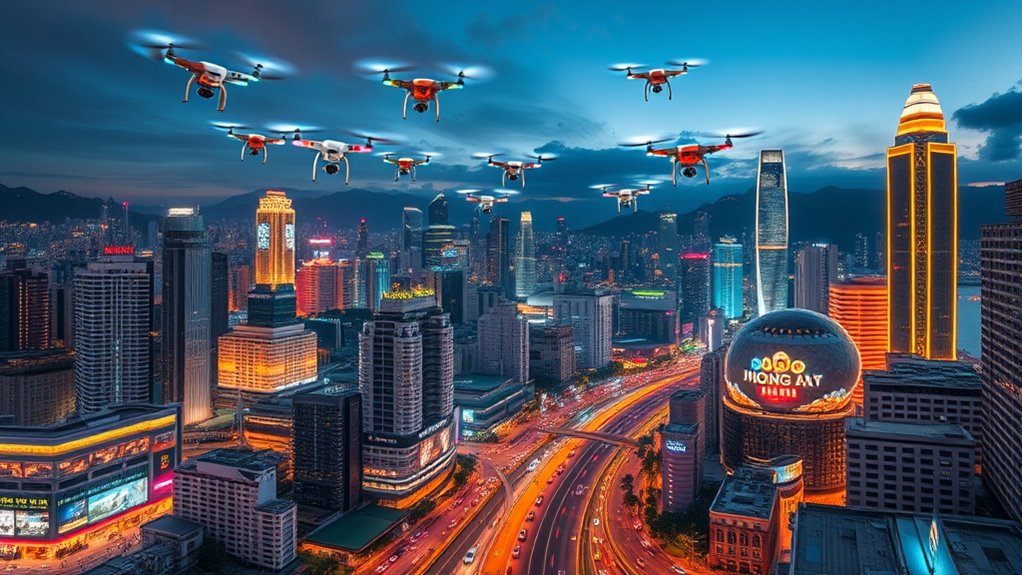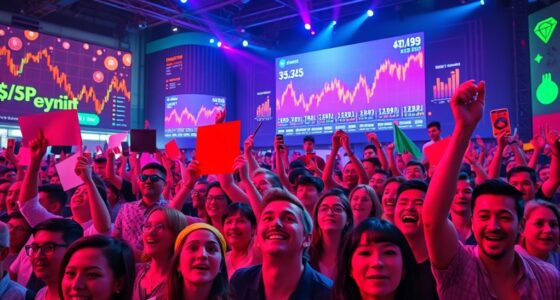By 2027, Hong Kong plans to deploy AI across 200 public services, making processes faster and more efficient. The city is expanding its CCTV network to 7,000 cameras, integrating AI and facial recognition for enhanced safety. While civil service jobs may decrease by 5%, retraining programs will support displaced workers. This massive AI effort aims to boost public safety and streamline services—discover more about how these plans will shape Hong Kong’s future.
Key Takeaways
- Hong Kong plans to integrate AI into 200 public service procedures by 2027, focusing on efficiency and automation.
- The government has allocated HK$1 billion to establish an AI Research and Development Institute to support innovation.
- The CCTV network will expand to 7,000 cameras by 2027, incorporating AI and facial recognition for public safety.
- AI deployment includes enhancing crime prevention, border security, and public safety measures across the city.
- Significant workforce adjustments include about 10,000 civil service job cuts by 2027, with retraining programs in place.

Hong Kong is set to deploy artificial intelligence across its public services by 2027, aiming to create a more efficient and digitalized bureaucracy. You’ll see AI integrated into 200 government administrative procedures by then, with the first 100 procedures targeted for completion by 2026. These initial deployments will focus on data analysis, customer service, licensing, and permits, streamlining tasks that traditionally require manual effort. The government views AI development as a crucial industry that cuts across sectors, emphasizing its role in transforming the city into a tech-driven hub. To oversee this shift, they’ve established the AI Efficacy Enhancement Team, comprising senior officials and private sector experts, tasked with guiding the citywide digital transformation and ensuring cohesive governance. Implementation Timeline and Scope You’ll notice significant investments supporting this push, including HK$1 billion allocated to establish the Hong Kong AI Research and Development Institute under the Digital Policy Office. Starting mid-2026, the institute will spearhead projects across finance, healthcare, and logistics, with a broad rollout slated for 2027. These initiatives aim to foster innovation, accelerate research, and commercialize AI solutions while building a strong talent pipeline through expanded training programs and enhanced admission schemes, especially targeting international AI experts via the TechTAS scheme. Color accuracy is essential in these AI systems to ensure reliable data interpretation and decision-making.
As part of this transformation, the city plans to expand its SmartView CCTV network to 7,000 cameras by 2027, adding between 2,000 and 2,500 cameras annually. These cameras will incorporate AI and facial recognition in the next phases, promising improved public safety and crime prevention. Already, the system has helped solve over 300 criminal cases and made nearly 600 arrests by mid-2025. Facial recognition technology is in use at border crossings and pilot tourist zones, with further deployment pending privacy assessments and regulatory approval. These measures aim to strengthen security while balancing privacy concerns.
The government envisions a future where AI and human effort work hand-in-hand. To support this, they’re investing in research centers and fostering partnerships between universities, industry, and the public sector. This ecosystem encourages innovation and aims to develop AI solutions tailored to local needs. However, the shift will also impact employment; approximately 10,000 civil service jobs—about 5% of the workforce—are expected to be cut by April 2027 as part of cost-saving measures. To cushion this impact, ongoing retraining programs will help displaced workers transition into new roles within an AI-augmented public sector, while civil servants face a pay freeze during 2025-26.
Frequently Asked Questions
How Will AI Impact Hong Kong’s Job Market?
AI will substantially reshape your job market, causing some roles to disappear while creating new opportunities. You might face layoffs in administrative, clerical, or finance jobs if you don’t develop AI skills. However, if you embrace AI, you can stay relevant, as sectors like IT, transportation, and logistics grow. Upskilling and adapting to new tech will be key to thriving amidst these changes and avoiding displacement.
What Privacy Measures Will Protect Citizens’ Data?
You’re protected by strict privacy measures that guarantee your data stays safe. Organizations must follow the Personal Data (Privacy) Ordinance, which enforces rules like data minimization and obtaining your explicit consent. They also implement security controls such as encryption and access restrictions. Transparency is prioritized through clear policies, regular audits, and oversight by the Privacy Commissioner. Human oversight and ongoing privacy impact assessments help prevent misuse and safeguard your personal information.
Will AI Deployment Widen Social Inequality?
You might worry that AI deployment will widen social inequality, and you’re right to be concerned. As high-skill jobs grow, many mid- and low-income workers could face displacement, leaving them behind. Surveillance might target marginalized neighborhoods, deepening social divides. Without equitable access to AI education and infrastructure, the gap between the tech elite and underserved communities could grow, making society more divided and unequal than ever before.
How Will AI Influence Hong Kong’s Traditional Industries?
AI will transform Hong Kong’s traditional industries by making operations more efficient and smarter. You’ll see automation streamline workflows in manufacturing, logistics, and finance, reducing manual work and speeding up processes. This shift will require you to learn new skills and adapt to new tools. Overall, AI helps you work faster, better, and more competitively, but it also means staying updated and reskilling to keep up with industry changes.
What Ethical Guidelines Are Being Established for AI Use?
You’ll find that Hong Kong has established extensive ethical guidelines for AI use. They emphasize transparency, fairness, and human oversight, ensuring AI systems are reliable, secure, and respect privacy. Developers, service providers, and users all have clear responsibilities, like testing AI thoroughly, protecting personal data, and verifying content. These guidelines aim to foster responsible AI deployment while balancing innovation with public safety, aligning with local laws and international standards.
Conclusion
By 2027, Hong Kong’s massive AI deployment will transform how you experience city life, making processes faster and more efficient. You’ll see smarter transportation, better public services, and innovative solutions shaping everyday interactions. Isn’t it exciting to imagine a city that adapts seamlessly to your needs? As AI becomes more integrated, you’ll wonder how you ever managed without this technological leap. The future is here, and it’s happening right in Hong Kong’s streets.









